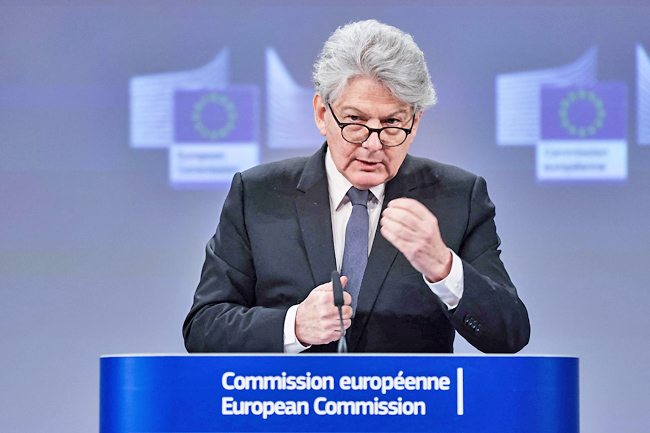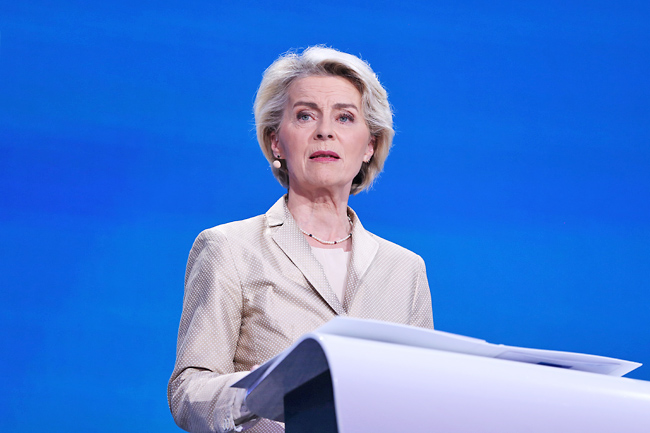BRUSSELS (AFP) – France’s powerful European Union (EU) commissioner Thierry Breton abruptly resigned yesterday with a parting shot at the bloc’s chief as she prepared to present her new team.
French President Emmanuel Macron proposed Foreign Minister Stephane Sejourne as Breton’s replacement.
Announcing his walkout the day before Ursula von der Leyen was expected to unveil her incoming team, the bloc’s internal market commissioner claimed the EU chief had sought at the last minute to push him out.
President Emmanuel Macron had put Breton’s name forward for France’s spot on the EU executive team, and his reappointment to a sizeable role – reflecting the country’s weight within the 27-nation bloc – had been taken as a given.
“In the very final stretch of negotiations on the composition of the future College, you asked France to withdraw my name,” Breton wrote in a scorching letter to von der Leyen, posted on X.
“In light of these latest developments – further testimony to questionable governance – I have to conclude that I can no longer exercise my duties in the College,” he wrote. “I am therefore resigning from my position as European Commissioner, effective immediately.”


A European Commission spokeswoman told reporters that von der Leyen had accepted Breton’s resignation and “thanks him for his work as commissioner throughout the mandate”.
In Paris, Macron’s office said the president was instead proposing Sejourne for an EU portfolio focused on “industrial and technological sovereignty and European competitiveness”, highlighting his past experience leading the centrist Renew group in the European Parliament.
It remained unclear, however, whether von der Leyen would be able to present her top team as planned today – a timeline already pushed back once amid a row over gender parity.
Breton, whose strained relationship with his EU boss was no secret during her first five years in office, claimed in his letter that von der Leyen’s bid to block his candidacy was made “for personal reasons that in no instance you have discussed directly with me”. He said she had “offered, as a political trade-off, an allegedly more influential portfolio for France”.
One of the most influential figures in Brussels, Breton has been the bloc’s internal market commissioner since 2019 and has taken a hard line against abuses by the world’s biggest digital platforms – even sparring publicly with Elon Musk.
His portfolio also included defence and space, overseeing a defence industry push and marshalling the production of COVID-19 jabs.
The former chief executive offier of France Telecom had been tipped to receive a promotion as a commission vice president stewarding industrial growth.
The 69-year-old was seen by Paris as a key counterweight to Berlin’s influence at the heart of the EU.
“Over the past five years, I have relentlessly striven to uphold and advance the common European good, above national and party interests,” Breton wrote in announcing his resignation.
“It has been an honour.”
The centrist Breton has been outspoken in challenging von der Leyen – and caused a stir earlier this year by publicly questioning the depth of support for her reelection within her centre-right European People’s Party.
Breton was also one of four commissioners who questioned her “transparency and impartiality” over the appointment of a political ally to a highly-paid post as small and medium-sized enterprises envoy.
“It shows her strength to kill ‘powerful’ Breton,” commented one EU diplomat, speaking on condition of anonymity, judging that von der Leyen “comes out stronger out of this”.
How the 27-member commission’s portfolios are divided up will send a strong signal regarding the bloc’s political direction and the relative influence of each member state – after EU Parliament elections in June marked by far right gains.
Von der Leyen has been leaning on member countries to put forward more women for the bloc’s executive arm, after most – including France – ignored her request to offer a choice of male or female candidates.
The furore in Brussels came as France awaits the formation of a new government by conservative Prime Minister Michel Barnier, named by Macron as a compromise pick after June elections produced a hung Parliament.






